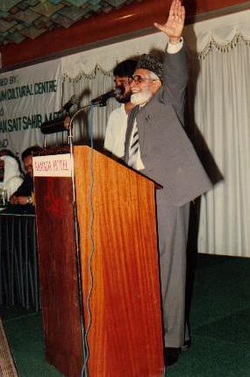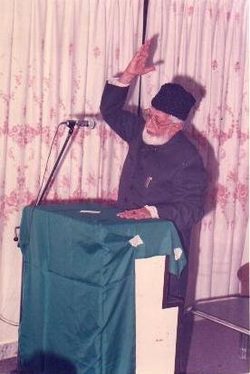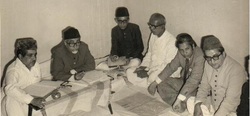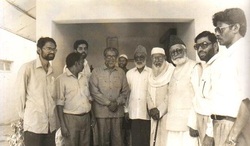Ebrahim Sulaiman Sait recants the period of 40 years between 1960 and 2000 as the most important part of his life. During this period he was able to serve the Muslims, backward and the downtrodden in the company of great national leaders and eminent scholars both inside and outside the parliament.
He understood that the basic problems facing the Muslims under the prevailing climate of insecurity and non-implementation of the right guaranteed to them under the constitution, and strove to achieve them.
He spoke out against the reactionary, fascist, and communal elements threatening the integrity and secular character of the country.
He understood that the basic problems facing the Muslims under the prevailing climate of insecurity and non-implementation of the right guaranteed to them under the constitution, and strove to achieve them.
He spoke out against the reactionary, fascist, and communal elements threatening the integrity and secular character of the country.
Illegal Migrants (Determination by Tribunals ) Act
The Illegal Migration (Determination by Tribunals) Act contained many provisions extremely dangerous to the minorities, giving ample scope for biased authorities and aggressive communalists to play havoc with the very existence of minorities in India. For instance, it allows anyone to question the nationality by a mere payment of Rs. 25/- and then remain non answerable or non accountable, whereas the burden of proof shifts on the accused. Sait sahib spoke against such provisions and also demanded proper rehabilitation of minorities in Assam, where this act was first implemented.
Communal Violence
Communal violence and killing of Muslims went on unabated over 30 years, heralded by the chauvinist and fascist forces with the objective of wrecking the solidarity of Muslims, crushing them economically, and annihilating their dignity.
The first major communal riot during Sait sahib's tenure in Parliament was in Jabalpur in 1962. Throughout the next 30 years riots occurred in a systematic manner across the country at Calcutta, Jamshedupur, Roukela, Ranchi, Ahamedabad, Bombay, Nanded, Hyderabad, Moradabad, Varanasi, Malegaon, Aligarh, Bhagalpur, Surat, Bhopal, Bangalore, Mysore, Delhi and other places, culminating in the riots that followed L KAdvani's rath yathra to demolish the Babari masjid and the countrywide riots following the demolition of Babari masjid.
For Sait sahib, politics was not a game, but a very wise and serious thing to engage in. He never tried to hide his emotions whether in parliament or in a riot zone. His emotions were always for the noble causes. His empathy was for the suffering of his beloved community. Wherever there was a riot, whether in Jabalpur (1962) or Moradabad (2002), he didn’t delay his visits to the victims; he minced no words in arguing for justice for the thousands of victims he met.
Between 1962 and 1988 Sait sahib traveled extensively with people such as Maulana Atheequ Rahman Saheb, Maulana Mohammed Yusuf Saheb, Prof. Mohammed Sulaiman Sahib, Mr. G. M. Banathwalla, Mulla Jan Mohammed, Dr. Syed Mohammed and others to almost all places where communal flare-ups had caused devastation, arson, loot, plunder, killings, and carnage, with Muslims being the main victims. The tours were conducted by Indian Union Muslim league, Muslim Majlise Mushavirath and Mujahidul Islam Qasimi Jamia Milia to express sympathy and offer relief for the victims, and to maintain communal harmony.
The first major communal riot during Sait sahib's tenure in Parliament was in Jabalpur in 1962. Throughout the next 30 years riots occurred in a systematic manner across the country at Calcutta, Jamshedupur, Roukela, Ranchi, Ahamedabad, Bombay, Nanded, Hyderabad, Moradabad, Varanasi, Malegaon, Aligarh, Bhagalpur, Surat, Bhopal, Bangalore, Mysore, Delhi and other places, culminating in the riots that followed L KAdvani's rath yathra to demolish the Babari masjid and the countrywide riots following the demolition of Babari masjid.
For Sait sahib, politics was not a game, but a very wise and serious thing to engage in. He never tried to hide his emotions whether in parliament or in a riot zone. His emotions were always for the noble causes. His empathy was for the suffering of his beloved community. Wherever there was a riot, whether in Jabalpur (1962) or Moradabad (2002), he didn’t delay his visits to the victims; he minced no words in arguing for justice for the thousands of victims he met.
Between 1962 and 1988 Sait sahib traveled extensively with people such as Maulana Atheequ Rahman Saheb, Maulana Mohammed Yusuf Saheb, Prof. Mohammed Sulaiman Sahib, Mr. G. M. Banathwalla, Mulla Jan Mohammed, Dr. Syed Mohammed and others to almost all places where communal flare-ups had caused devastation, arson, loot, plunder, killings, and carnage, with Muslims being the main victims. The tours were conducted by Indian Union Muslim league, Muslim Majlise Mushavirath and Mujahidul Islam Qasimi Jamia Milia to express sympathy and offer relief for the victims, and to maintain communal harmony.
Shah Banu Verdict
The Adoption Bill introduced in the Rajya Sabha in 1971, and the Shah Banu verdict of the Supreme Court in 1972 regarding payment of maintenance to a divorced women sought to interfere in the personal laws of Muslims, which is a part of Sharia ordained by Almighty Allah in the Quran.
Aligarh Muslim University
Ebrahim Sulaiman Sait was in the forefront of the struggle to to retain the minority character of Aligarh Muslim University (AMU) which was annulled by an act of the Parliament. He was part of an action committee that involved Mohammed Yusuff Siddiqui, Janab Safique Rahman Sahib and Mohammed Zafar Sahib. The efforts of the committee bore fruit, and in 1979 the minority status of the University was restored, albeit in a restricted manner. Sait sahib went on to become a member of the AMU court.
Jamia Milia Islamia
The Jamia Millia islamia, Delhi was established by the joint efforts of Maulana Mahmodul Hassan Dehlavi, Maulana Mohamed Ali, and Dr. Mukthar Ahmed Ansari, and later patronized by Dr. Zakir Hussain. A new bill to recognize this institution as a university sought to replace Urdu with English as the medium of instruction of the university, and remove quota for Muslim minorities while retaining quota for women and handicapped. This would sought to do away with the very purpose for which the university was established: viz educational upliftment of Muslims.
Ebrahim Sulaiman Sait took a vocal and leading role in demanding the restoration of the minority character of the University.
Ebrahim Sulaiman Sait took a vocal and leading role in demanding the restoration of the minority character of the University.
Other Activities
Ebrahim Sulaiman Sait also took a leading role in championing the rights of Muslims.
- Sait Sahib demanded that the mosques taken over by the Archaeological Society of India in different parts of the country be restored and thrown open for namaz.
- Sait sahib spoke out against the mismanagement of wakfs. In most of the states, the Walkf board was constituted by nominated members of the ruling party, and they indulged in open mismanagement, misappropriation of walk funds and alienation of wakf properties.
- He also raised his voice against the unsatisfactory administration of the central Hajj committee, especially the failure to provide proper accommodation and facilities to the pilgrims during their journey to Hajj.
- He successfully mediated a dispute between the Sunnis and the Shias regarding digging up of certain shrines at the Sunni graveyard in Lucknow. He himself appeared in the court and effected an amicable settlement between the Sunnis and Shias regarding the graveyard.
- He spoke out against the delimitation of parliamentary and assembly constituencies in an unfair manner, aimed at making it difficult for Muslims to secure their due representation. He also spoke out against the improper preparation of electoral rolls and deleting of hundreds of Muslims from the electoral rolls in many constituencies. He advocated the case of proportional representation in parliament and assembles.
- He championed the cause of Urdu, and demanded its implementation as the second language in Uttar Pradesh.
- He championed the cause of sate funding of elections to eliminate the role of money power.
- He protested the planned attempts to saffronize education system and re-writing history against the facts recorded by eminent scholars. At the same time he spoke out for reforming the education system in India.



